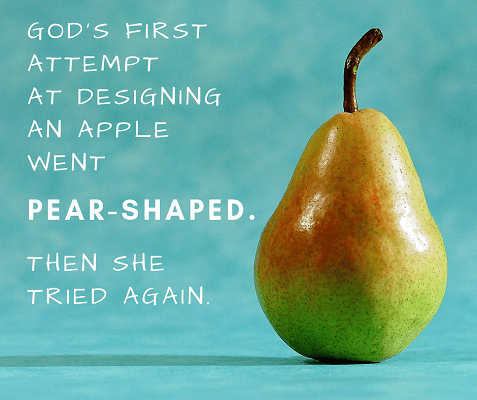
YouTube / iTunes / Spotify / Radio Public / Pocket Casts / Google Podcasts / Breaker / Overcast
Listen to ArtisanEnglish.jp posts & lesson intros here.
Idiom: Go pear-shaped
Let’s talk about shapes for a few minutes.
Architecture and design are all about the search for the perfect form and function.
For example, hearing someone talk about a perfect circle or square is common.
There is beauty in perfection.
Most things in nature are round.
Nature doesn’t do square.
She does round.
Apples are round.
Oranges are round.
Watermelons are roundish.
How about a pear?
Pears are well pear-shaped.
What does pear-shaped mean?
When a plan or strategy goes pear-shaped, it goes wrong.
There’s nothing perfect about a pear-shaped anything.
Yes, pears taste nice.
Some people even love pears.
For some, pears are their favourite fruit.
The shape of a pear, however, is never referred to as being perfect.
This expression, go pear-shaped, is often used in English-speaking countries except for the United States.
I’ve read that it originated from the British military sometime around the late 1940s or the early 1950s.
The expression’s origin is interesting to know but not essential to understanding the meaning.
When things go wrong, they go pear-shaped.
Recently, during Typhoon 21 in the Kansai region of Japan, a tanker ship crashed into the bridge which connects Kansai International Airport to the mainland.
Now, we can be quite sure that whatever the tanker captain had planned, crashing into the bridge was not a part of it.
We can safely say that the captain’s plan, whatever it was, went pear-shaped in a horrible way.
Also, during the same typhoon, many people were stranded at hotels, airports, train stations, and perhaps other places.
Typhoon 21 caused the plans of many unfortunate people to go pear-shaped.
There will be more typhoons, and more plans will go pear-shaped.
The best way to avoid this is to avoid making arrangements to do anything during a typhoon.
Flesch-Kincaid Readability Test
This post is understandable by someone with at least a 7th-grade education (age 12).
On the Flesch-Kincaid reading-ease test, this post scores 71.
The easier a passage is to read, the higher the score on a scale of 0 – 100.

